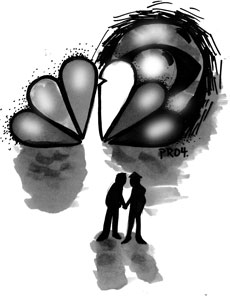Opinion: Wrong choice

Online Poster
Dec 7, 2004
Red ropes cordon off the entry to a church. “Bouncers” permit people to enter on a case-by-case basis.
Two men holding hands are turned away.
A young black girl, Latino man and person in a wheelchair – all turned away.
The people in the scene are characters in a commercial for the United Church of Christ.
“Jesus didn’t turn people away,” a message reads. “Neither do we.”
Get The Daily Illini in your inbox!
The commercial is airing on several networks, including ABC Family, AMC, BET, Discovery, Fox, Hallmark, The History Channel, Nick@Nite, TBS, TNT and TVLand.
However, NBC and CBS have refused to allow commercial airtime and have opted for a different commercial from the United Church of Christ.
“People fear the wrath of those from the Christian right or people who are not accustomed to an all-inclusive message,” said Rev. Ben Guess of the United Church of Christ in an article in The Journal News.
NBC executives said the “issue went beyond gays. … Politics has nothing to do with this decision.”
We disagree. The commercial packs quite a punch – tackling a prevalent societal and political issue.
CBS used the recently proposed constitutional amendment defining marriage as a reason for the rejection of the commercial. The ad might not directly comment on same-sex marriage, but many viewers might feel uncomfortable with the image of the two men, as well as two women embracing, because of the perceived implications.
Unfortunately, this does not dissuade us from thinking the commercial should air.
The commercial’s approach is a conceptual one – one that is antagonistic, confrontational and unrealistic.
After all, most churches would not prevent people from entering, but some sects of Christianity have reputations for making minorities feel unwelcome.
The fact is, the advertising departments of major networks such as CBS and NBC don’t carry the same responsibilities as the news or entertainment sectors.
Companies and organizations pay advertisers to publicize their products or services. CBS and NBC have the right to refuse the ad, but that doesn’t make them correct in doing so.
The ad would open up for discussion an intimidating and incendiary issue. Sadly, the networks attempted to avoid the fire by rejecting the commercial.
But attempts to quell the issue have only ignited it.
“We have just heard overwhelmingly from our members and our pastors that they want to be involved and want to express their displeasure with the networks,” Guess said.
Church officials now report that more than 300,000 people – compared to a normal rate of 15,000 – have visited their Web site to view the commercial.





